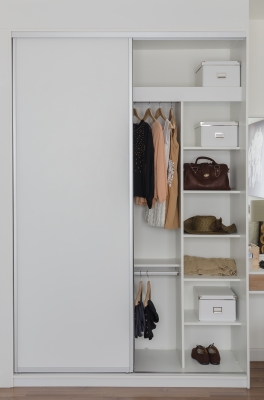 freedigitalphotos.net by khongkitwiriyachan
freedigitalphotos.net by khongkitwiriyachan In my work with clients I often see someone using a system that is overly complicated, has too many steps or is extraordinarily time-consuming. As an objective observer I see alternative methods that would be easier and reduce stress in the long run. Do you need to find simpler ways to do things, manage time, or store belongings? Here are some poor systems and ways that they were made easier.
- Problem: I had a client who stored all his office supplies down the hall many steps away from his office. This client believed that his method was logical and well organized. However, it took too much time to access the supplies and he became easily distracted along the way.
- Solution: adequate storage space was introduced by moving a cabinet into the office to hold the larger office supplies. Additional containers were purchased to hold frequently used desk accessories so that they were handy.
- Problem: another client insisted that all her clothes fit in one closet, which they truly did not. It took a herculean, shoulder-wrenching effort to make space on the rod to insert a hanger. Plus, tricky specialty hangers designed to store multiple tops or pants required too much effort to be useful. Thus, most of her clothing accumulated in amorphous piles on the bureaus.
- Solution: the simple solution was to remove some clothes for donation and to seasonal storage. This took time initially but in the long run saved stress by making it easier to put clothes away.
- Problem: I see many clients who retain too much paper. There is a lack of space to store it all and oftentimes important papers become lost. More than one client has saved every paid bill in its respective envelope. Likewise bank statements, utility bills, financial statements and medical benefit are saved in original envelopes. This practice takes up too much space and often these envelopes are stacked on tables and furniture rather than filed appropriately.
- Solution: in these cases we open every envelope and throw away/recycle/shred the unnecessary envelopes, inserts and generic notices. We also discuss the purpose of saving particular papers, filing the current ones in labeled file drawers, archiving the rest in storage boxes.
Do you have a system or habit in your life that is causing stress? Or one that is taking too much time? Or one that you avoid? Ask yourself, “How can I make this simpler?” “What would be the consequences of making a change?” “What would a new way look like?” “How could I streamline this task?” Weigh the alternatives that you brainstorm then choose one and do it. There is no harm in starting over from scratch if the system does not work as expected. As least you would have tried and eliminated that option. Repeat the process again and maybe again until you have figured out a more efficient system. It often helps to read books, research online advice, ask questions, call a friend or hire someone. Find out how other people solve a similar problem. There is no excuse to continue using a complicated system. Invest some time to fix it! You will thank yourself for making your home more simple and your life more calm.
 freedigitalphotos.net by ponsuwan
freedigitalphotos.net by ponsuwan Simple is easy.
Simple is fast.
Simple is fewer choices.
Simple is open shelving.
Simple is fewer things.
Simple is a schedule.
Simple is being flexible.
Simple is clean.
Simple is slowing down.
Simple is open bins and baskets.
Simple is fewer distractions.
Simple is less often.
Simple is a larger trash can.
Simple is fewer steps.
Simple is no excuses.
Simple is relaxing.

 RSS Feed
RSS Feed
